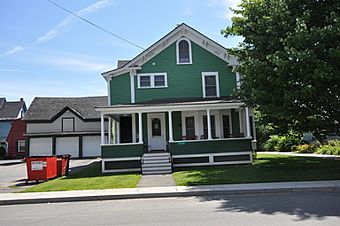Caleb H. Marshall House facts for kids
Quick facts for kids |
|
|
Caleb H. Marshall House
|
|
 |
|
| Location | 53 Summer St., St. Johnsbury, Vermont |
|---|---|
| Area | less than one acre |
| Built | 1858 |
| Architectural style | Italianate, Colonial Revival |
| MPS | St. Johnsbury MPS |
| NRHP reference No. | 94000868 |
| Added to NRHP | August 16, 1994 |
The Caleb H. Marshall House is a really old and interesting building in St. Johnsbury, Vermont. It's located at 53 Summer Street. This house was built around 1858, which is a long time ago! Over the years, it has been changed and added to many times. It started as a family home, then became a special kind of recovery center, and now it has several apartments inside. Because of its history, it was added to the National Register of Historic Places in 1994.
About the House
The Caleb H. Marshall House is in a neighborhood west of downtown St. Johnsbury. It sits on the east side of Summer Street. The property has a main house and a large garage at the back.
The front part of the house is two and a half stories tall. It has a style called Italianate, which was popular in the mid-1800s. You can see paired brackets under the roof and a round-shaped window near the top.
A porch in the Colonial Revival style wraps around the front and left side of the house. This porch has round columns that hold up the roof. The main entrance is on the left side of the front. There's also a cool window bay with many sides on the right. The right side of the house also has parts that stick out. The long back part of the house has porches too.
A Look Back in Time
This land already had a house on it when Charles G. Marshall bought it in 1853. His son, Caleb Marshall, was a brass finisher. Caleb is known for updating the house in 1870. He added the Italianate features that you can still see today.
Caleb Marshall often had people staying in his house. These were called "boarders." This means he rented out rooms to people.
In 1919, Caleb's daughter sold the house to Harriet Frost. Harriet Frost opened what was likely the first recovery center in St. Johnsbury. This center probably helped people who were sick during the 1918 influenza epidemic. The long back part of the house and the front porch were added around this time.
The house stopped being a recovery center in the 1930s. After that, the back part was changed into apartments. The garage was built around 1940, which was also when the apartments were created.



